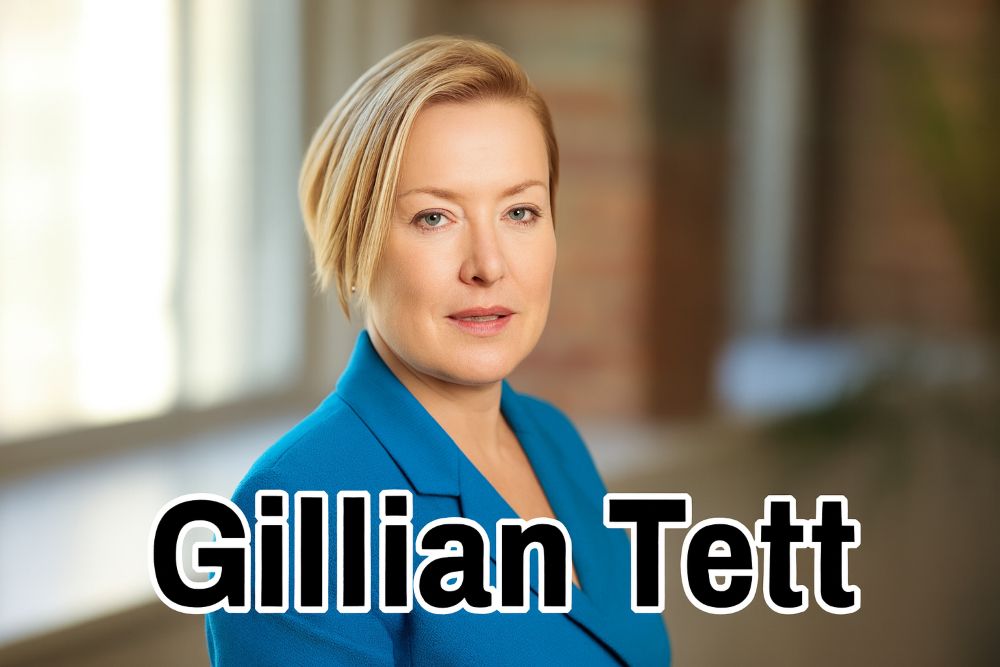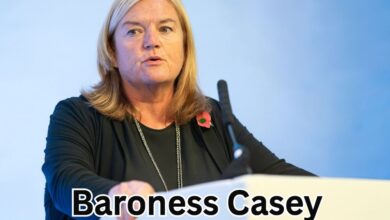Gillian Tett: The Visionary British Author and Journalist Who Bridged Anthropology and Finance
How a brilliant mind reshaped economic storytelling through insight, courage, and cultural understanding

Table of Contents
ToggleIntroduction
Gillian Tett, a renowned British author and journalist, stands as one of the most influential voices in modern financial journalism. With a unique background in social anthropology, she has transformed how the world understands markets, money, and the human forces behind them. Her ability to connect culture with commerce has made her a pioneer in interpreting the social fabric that drives the global economy. Known for her deep intellect and fearless journalism, Tett’s story is a testament to the power of knowledge and critical thinking.
Tett’s groundbreaking work at the Financial Times and her thought-provoking books such as Fool’s Gold and Anthro-Vision have redefined business reporting. Her journey from the study of Tajik villages to leading global newsrooms exemplifies how anthropology and economics can merge to reveal powerful truths.
Quick Bio
| Full Name | Gillian Romaine Tett |
|---|---|
| Date of Birth | 10 July 1967 |
| Age | 58 years (as of 2025) |
| Birthplace | London, United Kingdom |
| Nationality | British |
| Profession | British Author, Journalist, Anthropologist |
| Education | PhD in Social Anthropology, University of Cambridge |
| Current Role | Provost of King’s College, Cambridge & Editorial Board Member, Financial Times |
| Children | Two |
| Awards | OBE (2024), Journalist of the Year, Wincott Award, President’s Medal (British Academy) |
Early Life and Education
Born in London on July 10, 1967, Gillian Tett displayed early curiosity about people, society, and communication. Educated at North London Collegiate School, she developed an analytical mindset that later shaped her journalistic depth. Her fascination with human behavior led her to study Archaeology and Anthropology at Clare College, Cambridge, where she earned her bachelor’s degree in 1989.
Tett continued her academic journey by pursuing a PhD in Social Anthropology at Cambridge University. Her doctoral research took her to Tajikistan, where she studied community life and identity in a Muslim village. This immersive experience helped her understand the hidden structures of societies — knowledge she later applied to analyze global financial systems.
The Start of a Remarkable Career
Gillian Tett’s professional career began when she joined the Financial Times (FT) in 1993 as a correspondent. Her early assignments covered the former Soviet Union and Europe, regions undergoing massive political and economic transitions. Her sharp observations and cultural awareness quickly distinguished her as more than a reporter — she was a storyteller who saw systems as social organisms.
In 1997, Tett moved to Tokyo as FT’s bureau chief, where she examined Japan’s financial crisis and cultural response to economic stagnation. These experiences inspired her first major book, Saving the Sun, which explored Japan’s banking upheaval and corporate transformation.
Rise to Prominence at the Financial Times
As her reputation grew, Gillian Tett took on senior editorial positions at the Financial Times, including Capital Markets Editor, Assistant Editor, U.S. Managing Editor, and Editor-at-Large (US). Her articles went beyond numbers — they exposed the human motives behind market trends.
Between 2005 and 2007, she investigated complex financial instruments like derivatives and securitization. Her reporting during this period — notably before the 2008 global financial crisis — warned of systemic dangers that few others saw. When the crisis erupted, her predictions proved remarkably accurate, earning her widespread acclaim as a journalist who “saw it coming.”
Books and Intellectual Contributions
1. Fool’s Gold (2009)
In Fool’s Gold, Gillian Tett delves into the origins of the financial crisis, revealing how greed, innovation, and cultural blindness collided. The book became an international bestseller, earning her Financial Book of the Year. It established Tett as a critical thinker who merged economics with human psychology.
2. The Silo Effect (2015)
Here, she explored how corporate and institutional silos limit innovation and cause organizational failure. Using real-world examples from Sony, the Bank of England, and Facebook, Tett demonstrated how breaking down barriers enhances creativity and collaboration.
3. Anthro-Vision (2021)
Her most recent book, Anthro-Vision, presents a bold idea: applying anthropology to business and life. Tett argues that understanding human behavior — not just data — is vital to success in the modern world. The book was praised globally for introducing anthropology to corporate strategy and leadership thinking.
Awards and Recognition
Tett’s outstanding contributions have earned her numerous awards:
-
Wincott Award (2007) for excellence in financial journalism.
-
Business Journalist of the Year (2008) and Journalist of the Year (2009) at the British Press Awards.
-
President’s Medal from the British Academy (2011) for bridging academia and journalism.
-
Columnist of the Year (2014) for her continued excellence in economic commentary.
-
In 2024, she was honored as an Officer of the Order of the British Empire (OBE) for services to economic journalism.
Leadership and Current Role
In October 2023, Gillian Tett became Provost of King’s College, Cambridge, a prestigious academic leadership role. She continues to serve as Chair of the Editorial Board and Editor-at-Large (US) at the Financial Times. Beyond journalism, she co-founded Moral Money, an FT initiative promoting ethical and sustainable finance — a testament to her belief in responsible capitalism.
Legacy and Impact
Gillian Tett’s legacy lies in transforming journalism into a bridge between culture and commerce. She proved that understanding human behavior is as important as analyzing balance sheets. Her approach has influenced economists, business leaders, and journalists worldwide.
As a British author and journalist, she stands as a role model for critical thinkers who dare to question convention. Her career demonstrates that insight, empathy, and analysis can coexist to illuminate the unseen patterns driving our world. Her books and columns continue to inspire a new generation of journalists and academics to explore the human side of markets.
Conclusion
Gillian Tett’s journey from a social anthropologist to a global financial voice is an inspiring tale of intellect and courage. Her ability to foresee the unseen, question the powerful, and explain the complex with clarity defines her brilliance. Tett’s impact extends beyond journalism — she has changed how we perceive business, culture, and human behavior in a rapidly shifting world.
As she leads King’s College and continues to write, her ideas remain vital: understanding people is the first step toward understanding economies. In every sense, Gillian Tett stands as one of the most visionary British thinkers of our time.
FAQs
Q1: Who is Gillian Tett?
A: Gillian Tett is a British author, journalist, and social anthropologist known for her work with the Financial Times and her insightful books on finance and society.
Q2: What is Gillian Tett’s educational background?
A: She earned her PhD in Social Anthropology from the University of Cambridge.
Q3: What is Gillian Tett best known for?
A: She is widely recognized for predicting the 2008 financial crisis and applying anthropological perspectives to business and finance.
Q4: What are her notable books?
A: Her major works include Fool’s Gold, The Silo Effect, and Anthro-Vision.
Q5: What is her current role?
A: As of 2025, she serves as Provost of King’s College, Cambridge, and Editor-at-Large at the Financial Times.



